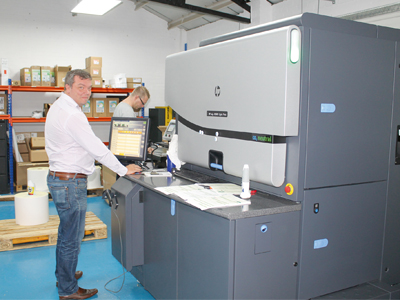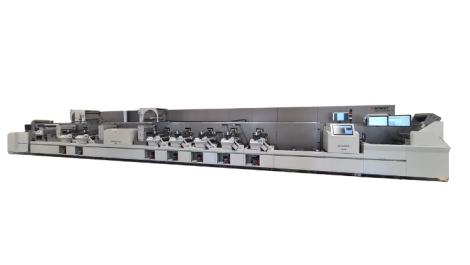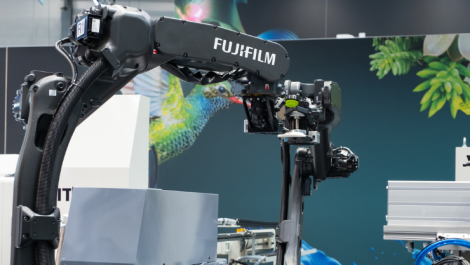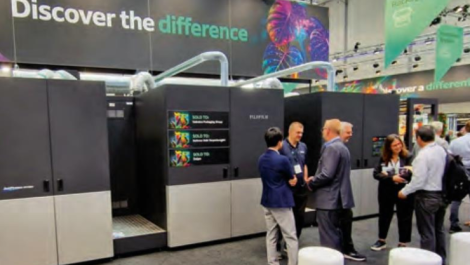Managing director Gary Burnley with the new WS6800
Marsh Labels is somewhat unusual in that it has never gone down the flexo route, but made the jump straight into digital colour label printing from being a niche hot foiling specialist. Neel Madsen went to visit the company to hear how digital has transformed this small family business completely and offered it the capability to print longer runs.
‘It has certainly been a big challenge and a very exciting rollercoaster, this digital adventure,’ said managing director Gary Burnley, who together with his sister and fellow director, Alison Welch, runs Marsh Labels. This is said with a big smile on his face, however, as he clearly likes challenges. And who can blame him? The company’s HP Indigo digital label presses have helped it grow turnover from £400,000 to in excess of £1.4 million in just seven years. The success is further evidenced by its recent move into new premises on the Mill Road industrial estate in Portslade, near Brighton; a space that is more than three times the size of its previous site.
Digital for longer runs
The first investment in 2009 in an HP Indigo ws4050 set Marsh Labels on a completely new and unknown path; a major turning point for the company which up until then had specialised in hot foil labels produced on a bank of Newfoil machines, a side of the business which is still active today. The foiling jobs usually involve a very small number of labels, so the capabilities of the new digital press opened up the opportunity to take on bigger jobs.
Mr Burnley explained, ‘Our customers were increasingly asking for full colour labels, and after a lot of investigation, we opted for going down the digital route. We do very short runs – I describe them as ‘micro runs’ – and flexo would not have been the right option for us. When other people talk about short runs, I look at them thinking, ‘Wow that’s actually a pretty decent job!’ Digital offered us the opportunity to do longer runs than what we were used to, but with a very fast turnaround.’
The gamble paid dividends and a second HP Indigo press, a ws4600, was added in 2010. This was replaced last year, after Mr Burnley shook hands on a deal for the WS6800 model HP Indigo press at Labelexpo in Brussels. The 6800 was chosen for its inline, closed loop colour management system and higher productivity, which will help the company progress even further.
The inventory at Marsh also includes two Digicon Lite finishing machines from AB Graphic for converting the printed labels. These compact machines offer excellent varnishing and die-cutting facilities, but Mr Burnley is looking at expanding the finishing department with more technically complex equipment to keep up with demand.
In the family
The family business was established by Gary’s father, Barrie Burnley, and his business partner Ron Marsh in 1983, a few miles down the road from the new home of Marsh Labels. It was a very small operation using small desktop printers with lead type and paste inks, later moving into very short run, hot foil labels in a limited number of colours. Gary himself grew up learning the trade first hand, and officially joined the business in 1993 when the staff counted just seven, including the family.
Until the move nine months ago, the label printing company was spread over two sites, but needed to consolidate and also add more space to accommodate its continued growth. The new building had to go through a complete overhaul, and is now a light and airy space with plenty of room for more machinery. Mr Burnley said, ‘The new place gives us a bit more elbow room and I’m looking at different options for the future.’
Industries supplied with labels cover most sectors, including retail, cosmetic, healthcare, food, beverage, security and industrial. The vast majority, some 80%, is supplied to label trade, and most of the rest to other resellers. This was not initially a conscious plan, but the company discovered that the demand was there. Mr Burnley said, ‘We had done a little bit of trade work before in hot foil, and when we asked those customers if they might want digital colour labels too, the answer was overwhelmingly positive. That’s how we got started, then after the press came in, word got around about our digital work and it just exploded from there.’
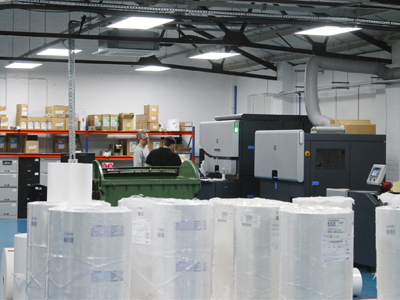
The new production hall at Marsh Labels
Today the company has some 11,000 customers on the books and aims to ship orders with 24 to 48 hours from approval of proofs. The day before I visited, the company had booked orders for some 356,000 labels, and 93,000 of those had already been shipped when we got chatting the next morning about the advantages of the Cerm management information system that knits together the whole operation. Some 19,000 different products are shipped in a year, with the average job length being around 3500 labels.
Managing information
As is most often the case, the digital learning curve has been steep for Marsh Labels. The press itself is in many ways the ‘easy’ bit, and as Gary Burnley and the team soon came to realise, getting the processes around it, and particularly the workflow, is vital.
‘The real challenge came in the second year after we installed the first digital label press,’ said Mr Burnley. ‘We actually invested more during that second year than we had on the press itself as we just hadn’t taken on board all that came with moving into digital printing.’
Juggling this huge amount of data requires having the right software in place, and an MIS was one of the larger investments that had to be made. Mr Burnley said, ‘Our Cerm management information system is invaluable and of huge importance to us in the day to day running of the company. We quote in excess of 100 jobs per day in house and our customers do the same using our web portal. Proof approval is also done online through the system, saving us a lot of time and effort.’
The staff level has grown during this time, and now numbers 18, four of whom work in the in-house studio. Both here and in the pressroom, double shifts have been implemented to keep up with demand, although they are essentially feeding only one press, the WS6800 as the ws4050 is mainly used as a back up. Mr Burnley said, ‘When we talk about digital, the real printing is done in the repro department not on press. That’s where we can make a difference. And if there is an issue on press, the job has to go back to the studio to get sorted out.’
The personal touch
When I asked Mr Burnley why he thought Marsh Labels had been so successful in digital, he said, ‘I strongly believe that it is all about relationships. You have to build up the trust with your customer; they need us and all the advice and support we can offer, as much as we need them in this business. At the end of the day, the digital press is the same wherever it is or whoever is operating it, and yes, we can make a bit of a difference in repro to the print quality, but customer service is key and that is what makes people come back.’
He concluded, ‘It has been an interesting and bumpy ride, but we took the plunge and opted for digital and it has certainly paid off.’

